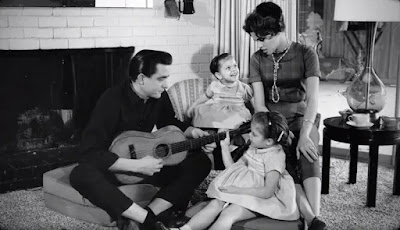MY DARLING VIVIAN
(director: Matt Riddlehoover; cinematographer: Josh Moody; editor: Matt Riddlehoover; music: Ian A. Hughes; cast: Rosanne Cash, Kathy Cash Tittle, Cindy Cash, Tara Cash Schwoebel; Runtime: 90; MPAA Rating: NR; producers: Dustin Tittle, Matt Riddlehoover; The Film Collaborative; 2020)
“Affecting documentary.”
Reviewed by Dennis Schwartz
Informative and revealing documentary by Matt Riddlehoover (“Paternity Leave “/”Scenes From A Gay Marriage”) on Johnny Cash’s mysterious first wife Vivian Liberto, as his four daughters (Rosanne, Kathy, Cindy, and Tara), who range in age from the late 50s to mid-60s, in separate interviews tell the story from mom’s side and correct how their mom was previously perceived and belittled by the Cash family in film’s like Walk The Line (2005). We see snippets from the film that praised to the skies Johnny’s second marriage to June Carter and painted a false portrait of Vivian as an angry woman trying to crush her absentee husband’s budding career.
The film features plenty of talking heads, interviews, film clips and never-before-seen footage and photographs of Johnny Cash and Rosanne Cash.
The affecting documentary by the gay filmmaker Riddlehoover and his marriage partner, his producer partner, the grandson of Liberto and Cash, Dustin Tittle, clears up an unknown part of the singer’s early life (hopefully for good!). Vivian is remembered by her daughters as an elegant and beautiful person, averse to the spotlight, and with a strong inner strength in dealing with how unfairly she was treated. If the film has a fault, it’s that we only hear from Vivian at the very end of the film.
We learn that in 1951, the 17-year-old Catholic schoolgirl Vivian Liberto, of a Sicilian-American heritage and with dark olive skin, a reason that some mistake her for being a Negro, meets the Air Force cadet from Arkansas, Johnny Cash, at the skating rink in her hometown of San Antonio. They have a summer romance and maintain a three-year-long correspondence while he’s stationed in Germany. When released from the service in 1954, they marry. The couple move to Memphis so Johnny can start a singing career, and he starts raising a family. With some success the family moves to California and live in a secluded mountain-top custom-built home in Casitas Springs. By 1961, Johnny Cash is a household name as a country singer, even reaching number one on the music charts. But his home life suffers because he’s always on tour, and their dream house it not a dream house to the family, as it’s invaded by unwanted fans and the patriarch is always on the road.
An unsettling scene was when Johnny, in 1965, was arrested for possession of amphetamines in El Paso, and a picture of his wife in the newspapers making her look black caused problems with the racists that made it necessary for Johnny to show proof his wife was indeed white or else he might be rejected in the south.
What the film does most effectively is show that Vivian was a wonderful loving mother (undeserving of the disdain showed her previously) and despite her love for Johnny, they weren’t compatible and a divorce after thirteen years of marriage was inevitable. Vivian died in 2005 at 71.

REVIEWED ON 5/1/2020 GRADE: B+